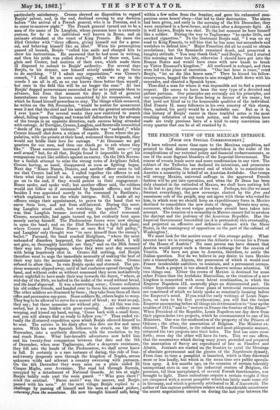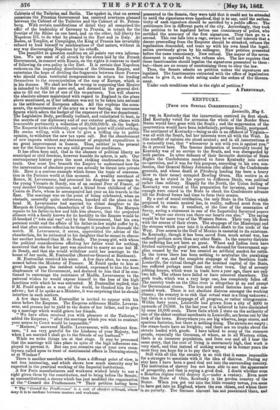THE FRENCH VIEW OF THE MEXICAN INTRIGUE.
[FROM OUR SPECIAL CORRESPONDENT.]
WE have referred more than once to the Mexican expedition, and pointed to that distant campaign undertaken in the midst of the complications of our external policy and financial embarrassments, as one of the most flagrant blunders of the Imperial Government. The course of events lends more and more confirmation to our view. The cabinet of the Tuileries has declared its intentions, and prosecutes alone an expedition, the avowed end of which is to constitute in America a monarchy in behalf of an Austrian Archduke. Our troops will occupy Mexico, universal suffrage in the approved French fashion will be put into operation, and when the Te Dewitt has been duly chanted in the cathedral of Mexico, we shall have nothing left to do but to pay the expenses of the war. Perhaps, too (for we must forecast everything), the new sovereign elected by the free and unanimous vote of the peoilk may not agree with those who voted for him, in which case we should keep an expeditionary force in Mexico destined to consolidate the new state of things. Events may arise, moreover, which the most vulgar prudence should have taken into account. The creation of a monarchy in Mexico cannot fail to awaken the distrust and the jealousy of the American Republic. Has the Imperial Government forestalled (as it is pretended) this eventuality, and projected an offensive and defensive alliance with the Slave States, in the contingency of opposition on the part of the cabinet of Washington ?,, We must look for the motive cause of this strange policy. What interest have we in creating across the Atlantic a throne for a Prince of the House of Austria? No saneperson can have dreamt that Austria would accept such a throne in exchange for the cession of Venetia. We have not gone to America, therefore, to settle the Italian question. Nor do we believe in any desire to turn Mexico into a transatlantic Algeria, the possession of which it would cost France incalculable sacrifices to maintain, and a permanent occupa- tion. Such a project is too absurd to deserve serious attention. Of two things one. Either the crown of Mexico is destined for some other Prince than the Archduke Maximilian, or the creation of a new kingdom is connected with some latent combination, in which the Emperor Napoleon III. assuredly plays no disinterested part. On either hypothesis some of those plans of territorial reconstruction arc concerned of which we lately spoke as constantly looming before the Emperor's mind. If you read the early writings of Louis Napo- leon, or turn to his first proclamations, you will find the future Emperor announcing before all things his determination to "tear up the treaties of 1815," and to "restore to France the frontier of the Rhine." When President of the Republic, Louis Napoleon one day drew from their pigeon-holes two projects, which he communicated to one of his Ministers. One was the confiscation of the property of the Princes of Orleans ; the other, the annexation of Belgium. The Minister ex- claimed. The President, in the calmest and most phlegmatic manner, returned the two projects into their holes. The first has since come forth; some day the other will have its turn. This we can affirm, that the manceuvres which during many years preceded and prepared the annexation of Savoy are reproduced of late in Flanders and Alsatia. Journals are started on the frontier to extol the blessings of absolute government and the glories of the Napoleonic dynasty. i From time to time a pamphlet s launched, which is then disowned more or less loudly, but which in the mean time sets public specula- tion agog. A few months ago, on the occasion of certain tolerably unimportant riots in one of the industrial centres of Belgium, the presence, till then unexplained, of several French functionaries, was brought to light. These indications acquire a certain weight if they are compared with a recent pamphlet which has lately made some stir in Germany, and which is generally attributed to M. d'Auerswald. The author of this curious publication relates with considerable minuteness the secret negotiations carried on during the last year between the
Cabinet* of the Tuileries and Berlin. The upshot is, that on several occasions the Prussian Government has received overtures planned between the Cabinet of the Tuileries and the Cabinet of St. Peters- burg. With certain modifications of detail they all comprised the offer of the leadership of Germany to Prussia, in return for the frontier of the Rhine on one hand, and on the other, full liberty for Napoleon III. to do what he pleased in the East and in Italy. At Baden, at Toeplits, at Compiegne, the King of Prussia has invariably refused to lend himself to combinations of that nature, without in any way discouraging NaRdeon by his rebuffs..
The pamphlet In question confirms on all points our own informa- tion, We are most of all struck by the stress laid by the French Government, in concert with Russia, on the rights it reserves to itself of following its own policy in the East. It is certain that Napoleon reckons on the impending dissolution of the Ottoman Empire, and entertains the hope of dividing the fragments between those Powers who should claim territorial compensations in return for lending themselves to the remanipulation of the map of Europe, which is 41 his dreams. We shall not be far wrong in supposing that Mexico is intended to fulfil the same end, and doomed in the general divi- sion to fill out the lot of one of the co-partners. You will observe the absolute silence maintained with regard to England in the plans above mentioned, as if her influence was not to be taken into account in the settlement of European affairs. All thia explains the arma- ments, the maintenance of the army on a war footing, the enormous figures which adorn the budget of the expenses of the war department. The Legislative Body & pacifically inclined, and uninitiated to boot, in the secrets of our diplomacy and of our exterior policy, claims with honourable pertinacity a reduction of 20,000,000 fr. on the budget. The Emperor kicks stubbornly, and upon that point will yield nothing. He seems willing, with a view to give a trifling sop to public opinion, to withdraw the new tax upon salt. But the abandonment of new imposts without any abatement of projected expenditure is no great improvement in finance. Thus, neither: in the present nor for the future have we any solid ground for confidence. It has often been said, that in the absence of political liberty no municipal or civil freedom, however humble its sphere, is safe. Our contemporary history gives the most striking confirmation to this truth. One must live beneath the Empire to understand how far the intervention of absolute power can actually be thrust into private life. Here is a curious example which forms the topic of conversa- tion in the Parisian world at this moment. A wealthy merchant of Rouen, M. Levavasseur, had promised his daughter in marriage to the young Vicomte de Bondy, son of an ancient Peer of France, of very decided Orleanist opinions, and a friend from childhood of the Comte de Paris, whom he accompanied last year on his travels in the East. The marriage was on the point of being celebrated, when an obstacle, assuredly quite unforeseen, knocked all the plans on the head. M. Levavasseur had married his eldest daughter to the Marquis de Conegliauo, chamberlain of the Emperor. The Marquis repairs to his father-in-law and bids him observe, that the projected alliance with a family known for its hostility to the Empire would be ill-brooked (" tres mal vue" eic) by the Government, that his own personal credit and the affairs of his father-in-law might suffer by it, and that after serious reflection he thought it prudent to dissuade the match. M. Levavasseur, it seems, appreciated the .advice of the chamberlain, for he intimated to his daughter that he meant to choose her another husband than M. de Bondy. The young girl, with whom the political considerations affecting her father went for nothing, answered that she for her part was resolved to marry no one but M. de Bondy, and that she would withdraw until her marriage to the house of her uncle, M. Fontenillat (Receiver-General at Bordeaux).
M. Fontenillat received his niece. A few days after, he was sum- moned before the Minister of Finance. M. Fould spoke to him at great length upon the incident related, expressed to him the keen displeasure of the Government, and declared to him that if he con- filmed to encourage the resistance of Iladlle. Levavasseur to the paternal wishes he would expose himself to the loss of the high functions with which he was entrusted. M. Fontenillat replied, that if M. Fould spoke as a man of the world, he thanked him for his advice ; but if he spoke as a Minister, it was surprising that he should interfere in such matters.
A few days later, M. Fontenillat is invited to appear with his niece before the Empress. The Empress addresses leladlle. Levavas- seur, and presses her to yield to the desire of her father, and to give up a marriage which would grieve her friends. "We have often received you with pleasure at the Tuileries," added the Empress; "after the marriage which you wish to contract your access to Court would be impossible." "Madame," answered Madlle. • Levavasseur, with sufficient firm- ness, "I am very grateful for the kindness of year Majesty, but when I am married I shall go to the friends of my husband."
While we write things are at that stage. It may be presumed that the marriage will take place in spite of the high influences em- ployed to prevent it. But can you conceive one of your own coun- trymen called upon to treat of matrimonial affairs in Downing-street, or at Windsor?
There is another anecdote which, from a different point of view, is not less interesting, and which shows how much sincerity may be expected in the practical working of the Imperial institutions. A. few Paris manufacturers and workmen wished lately to use a right given them by the constitution, and to bring before the Senate, as unconstitutional, a decree which has just modified the organization of the "Caused des Prudliommes."* Their petition having been
The "Conseil des Prudhommes" is a sort of elective tribunal, whose duty it is to mediate between masters and workmen. presented to the Senate, they were told that it could not be attended to until the signatures were Legalized, that is to say, until the authen- ticity of each signature should be certified by a public officer. The petitioners live in different parts of the city. Accordingly, they took the petition to be legalized before one commissary of police, who certified the accuracy of the first signatures. They then go to a second. This one falls into a rage, swears he will not tolerate that a decree proceeding from the Emperor should be attacked, refuses the legalization demanded, and tears up with his own hand the legali- zation previously given by his colleague. New petition presented before the same commissary. New refusal. The mayor of the Arron- dissement is appealed to, who refuses also. The law requires that these functionaries should legalize the signatures presented to them : but—there are no means of constraining them to obey the law. Thus, the Senate admits no petition unless the signatures are legalized. The functionaries entrusted with the office of legalization refuse to give it, no doubt acting under the orders of the Govern- ment.
Under such conditions what is the right of petition ?
A Flaxen sax .































 Previous page
Previous page